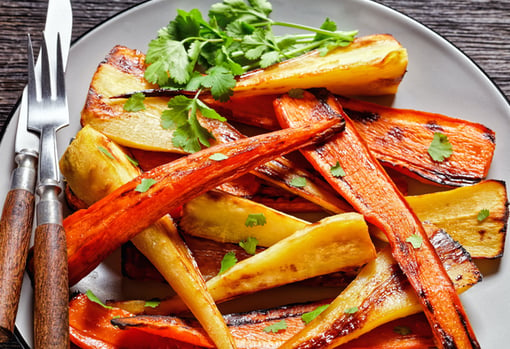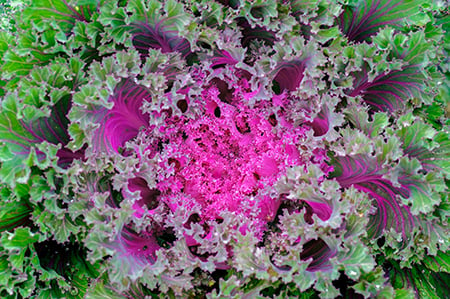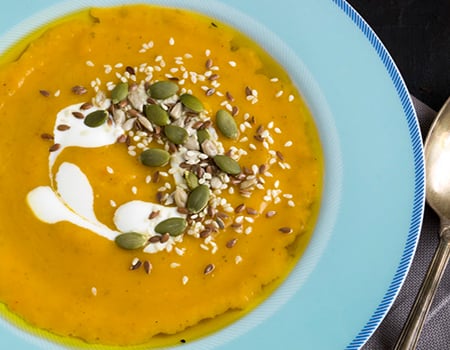Two Delicious Winter Beverages To Support Brain Health
Herbs and spices add a dose of mental healing to these favorite winter drinks.
The last frontier of health, as they say, is the brain. Since the brain and mental health are priorities in caring for ourselves and our loved ones, here are two of my favorite recipes for supporting brain health. They also happen to be delicious and worthy of making on the chilliest winter days. The first is Golden Milk with Turmeric and the second is Herbal Hot Cocoa, both with herbs and spices that have caught the attention of researchers seeking to improve mental clarity, cognition, memory, and overall feelings of happiness.
Golden Milk With Turmeric
In addition to being a warming spice that gets the blood moving, a gorgeous deep-orange dye for fabrics, and a popular anti-inflammatory especially for sore joints, the herb turmeric is proving to be incredibly useful for the brain.
Turmeric appears to act as an MAOI — a monoamine oxidase inhibitor. This means that it helps stop, or inhibit, the enzymes that are destroying the monoamines or neurotransmitters that our bodies need to function.
What are neurotransmitters?
There are lots of helpful neurotransmitters — and yes, medicinal herbs can influence how they function and help keep them healthy. Neurotransmitters include dopamine, serotonin, acetylcholine, and epinephrine, to name a few. These are molecules that are triggered to move from one neuron to the next — traveling across the synaptic cleft between neurons to cause a chain reaction that causes a (usually good) emotional or physical response in our bodies and brains.
For instance, you’ve probably heard of serotonin. It’s the monoamine that helps stimulate happy emotions. With it, we feel secure, confident, and generally more joyful. But if enzymes break down the serotonin before it can do its job, we feel sadness, lethargy and sometimes anxiety.
Certain herbs such as turmeric have been shown to stop these destructive enzymes and allow the serotonin to work. In this way, turmeric is being realized as a valuable brain support herb.
How does turmeric help?
Turmeric contains a chemical called curcumin, which may be the active component responsible or partially responsible for the MAOI action, (although I like to use the whole herb rather than isolated parts, which is closer to holistic medicine.)
In studies, it appears that turmeric supports the “nanny cells” that protect the neurotransmitters. These nanny cells clean up around the neuron and protect the myelin sheath, the fatty container that envelopes the neuron. Research shows that turmeric doesn’t directly support the neurotransmitter but rather aids the nanny cell, thus having a strong yet indirect effect.
It’s also possible that the turmeric is directly obstructing the enzyme and acting as an MAOI, preventing the neurotransmitter from being dissolved within the synapse, in which case this would be a direct supportive action.
Easy ways to use turmeric in the kitchen
Turmeric is easy to use but it has quite a bitter profile, which can ruin a good breakfast if you’re not expecting it. But the bitter can also support strong digestion, so it’s a good thing. Because of the bitterness, I find it helpful to add a sweetener to certain recipes such as the Golden Milk recipe below.
Using a high-quality turmeric powder is a good way to include this spice in your diet. Another way is to buy or grow your own turmeric plants and harvest the root; it slices easily and can be nibbled raw or sliced or minced into raw or cooked dishes.
My favorite ways to use turmeric are as fresh root grated onto foods, and as a powder. The fresh root is bright orange, rather small (like ginger), and wrinkly. Chop or mince it into stews, stir fries, sauces, curries, and even smoothies. The powder is easy to add to oatmeal or tomato sauce but be warned: it does impart a bitter flavor.
Should I take turmeric with milk?
It’s been shown that turmeric is most bio-available to our bodies when it is paired with two ingredients: fat and pepper. It’s a lipophilic herb, meaning it is fat-loving or fat soluble, so it’s good to consume it along with milk, avocados, olive oil, ghee, and other fats.
It is also improved by combining it with black pepper. Black pepper contains an alkaloid that seriously increases turmeric’s ability to do its job. You’ll find many high-quality turmeric capsules already contain pepper.
GOLDEN MILK WITH TURMERIC RECIPE
Many people like to consume turmeric in milk or plant-based milk beverages, along with pepper, honey, and ginger. I also like to add cocoa. Be sure not to consume more than 1-2 teaspoons per day, as too much can be bad for the liver. Here’s a delicious recipe for a Golden Milk that can be heated and enjoyed on chilly days. You’ll need:
1 cup milk (soy, flax, oat, almond, or cow)
1 teaspoon turmeric powder (OR 1-to-2 teaspoons grated fresh turmeric root)
2 pinches black pepper
1 teaspoon cocoa powder
1/2 teaspoon honey
Step 1: Heat the milk in a small saucepan and add the other ingredients except the honey, stirring constantly.
Step 2: Bring to a low simmer but do not let it boil. Simmer gently for 10 minutes.
Step 3: Strain and stir in the honey. Serve hot or warm.
Rich Winter Herbal Hot Cocoa
This is a silky, divine, heavy-on-the-chocolate and good for you hot cocoa recipe. As an herbalist, I love finding (and creating) recipes that honor herbs, feature delicious ingredients, and avoid fake fats, hydrogenated oils, and toxic sweeteners. This recipe provides the flavor, the adaptogenic herbs, and the cocoa — all for a delicious hot sipping cocoa that supports brain and mental health.
How to make delicious hot cocoa
The secret to strong, rich and healthy hot chocolate is to make it from scratch. Avoid those packets and strange marshmallow cubes! Once you have the ingredients (available at most health food stores) this is a quick recipe.
Since you’re using powders here, there is no steeping time required. And because it’s so easy, this is a great activity for children; they can help measure the powders while they inhale deeply — the scent is magical! — and they can practice measurements and math. You can make this recipe vegan by substituting soy, oat, almond or other plant-based beverage for the heavy cream.
The combination of bitter dandelion root and silky chocolate is enlivening and restorative. This recipe calls for 2-to-3 tablespoons of sugar which is divided between 2 and 4 servings, and is just enough to take the edge off the natural bitter flavor. For sweetness, try using beet sugar, sucanat, or even molasses.
Can my hot cocoa be brain-healthy?
You can up the healing quality of hot cocoa by adding adaptogenic herbs. These are herbs that help sustain us over the long-term, often providing endurance and helping our mental health, such as ashwagandha or eleuthero. These are herbs that not only keep the body going but support the brain in mental clarity.
HERBAL HOT COCOA RECIPE
This recipe yields between 2 and 4 servings, depending on the size of the mug you use, with an estimated 1 cup of hot cocoa beverage per serving. You’ll need:
2 tablespoons cocoa powder
1 tablespoon powdered dandelion root or powdered chicory root (see note)
1/2 teaspoon powdered cinnamon
1/2 teaspoon powdered ashwagandha or eleuthero, optional
2 to 3 tablespoons sugar
4 cups boiling water
½ cup heavy cream or other vegan milk of choice
Step 1: Put the cocoa powder, dandelion root, cinnamon, and sugar in a medium sauce pot.
Step 2: Pour the boiling water over them and whisk together well.
Step 3: When all these are blended nicely, add the heavy cream or milk and whisk again.
Step 4: Divide into mugs and serve. Optional extras: serve with fresh peppermint sprigs or sticks of cinnamon bark.
Herbalist, author and speaker Holly Bellebuono teaches plant wellness through her online school The Bellebuono School of Herbal Medicine. Her new course Herbs for the Brain is available as both a beginner course and a certificate course that is approved for CEUs.
Find holistic Herbs & Herbalists in the Spirit of Change online Alternative Health Directory.
RELATED ARTICLES:
The Exercise Pill: How Exercise Keeps Your Brain Healthy And Protects It Against Depression And Anxiety
Brain Research Shows The Arts Promote Mental Health











